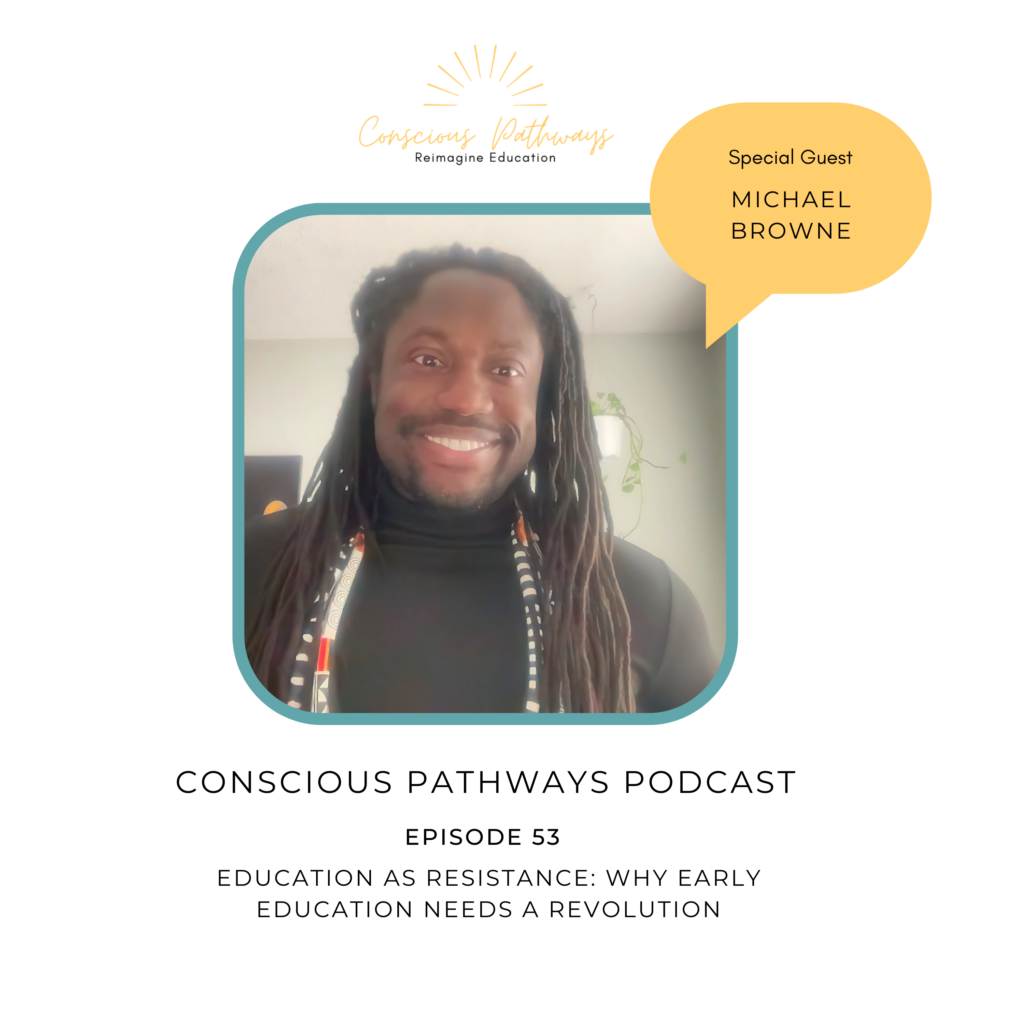Powered by RedCircle
Welcome to Conscious Pathways, where we explore the intersection of education and social justice through transformative conversations. In our latest podcast episode, I had the privilege of speaking with Mike Browne, Senior Director of Community Engagement at Cultivate Learning at the University of Washington.
Mike is a powerful advocate for culturally responsive and sustaining education. Our conversation challenged traditional narratives around early learning, explored the importance of belonging, joy, and play, and examined how we can shift our mindsets to create classrooms that truly serve Black and Brown children. In this post, I’m sharing key insights from our discussion—ones that will leave you reflecting on the role we all play in shaping the future of education.
Meet Mike Browne: Centering Identity in Education
Mike’s journey into education is deeply personal. Raised in New York with Afro-Caribbean roots, his background in community engagement, marketing, and early childhood education gives him a unique perspective on what it means to create affirming and liberating learning spaces.
Throughout our conversation, he emphasized that education should be more than a system that funnels children through academic checkpoints. Instead, it should be a space where children, especially Black and Brown children, see their identities valued, celebrated, and nurtured.
Mike pushes back against the idea that school is just a place to learn content. He reminds us that education should be about critical thinking, community, and humanity—a foundation that extends far beyond the classroom.
Cultivating Joy and Belonging in the Classroom
One of the most powerful themes of our conversation was the role of joy in learning. Mike emphasized that joy is not an afterthought—it’s a necessary condition for deep learning.
Too often, classroom management practices focus on policing behaviors rather than fostering relationships. But when we shift our approach to one that prioritizes belonging, connection, and curiosity, we create learning environments where children thrive—not just academically, but as whole human beings.
He shared stories of what it looks like when educators affirm students’ identities, rather than suppress them. Whether it’s through culturally relevant curriculum, building strong relationships, or simply allowing children to express themselves without fear of punishment, the impact of joy and belonging is transformative.
Rethinking Readiness: Preparing Children for Lifelong Success
We also dug into a critical distinction between schooling vs. education.
Schooling is often reduced to compliance, memorization, and test performance. But education, as Mike describes it, should be about cultivating curiosity, self-awareness, and critical thinking skills that empower children far beyond their school years.
This shift is especially important when we talk about kindergarten readiness. Rather than focusing on whether children can recite letters or sit still for long periods, we should be asking:
✔️ Are they developing a strong sense of self?
✔️ Are they learning to navigate relationships and express their ideas?
✔️ Are they experiencing joy and curiosity in their learning process?
When we redefine readiness in these terms, we set children up for lifelong success—not just academic achievement in the short term.
Rest as Resistance: Shifting Mindsets for Sustainable Change
Another powerful takeaway from our conversation was the need to challenge oppressive norms—not just in education, but in the way we care for ourselves as educators, caregivers, and advocates.
Mike spoke about the importance of rest as a form of resistance, especially for those working within systems that often demand relentless productivity. Rest isn’t just about avoiding burnout—it’s about reclaiming our humanity in a system that often devalues it.
Educators and caregivers who prioritize their well-being are in a better position to create learning environments that are grounded in joy, patience, and intention.
Reimagining Education: Where Do We Go From Here?
As we wrapped up our conversation, Mike posed a powerful question:
What would education look like if we centered the joy, agency, and identity of Black and Brown children?
To move forward, we need systemic shifts that uplift marginalized communities and disrupt harmful practices. That means:
- Creating policies that affirm and celebrate identity.
- Reevaluating discipline and behavior management through an equity lens.
- Valuing play, rest, and curiosity as essential components of learning.
- Centering community voices in decisions that impact children.
The future of education depends on our collective ability to reimagine what’s possible.
Final Thoughts: Join the Movement
My conversation with Mike Browne was a powerful reminder of why this work matters. Education should be a place where all children feel seen, valued, and empowered—not just prepared to pass tests, but equipped to navigate the world with confidence and joy.
So I’ll leave you with this:
What can you do today to make education a more affirming space for the children in your life?
Join the conversation by:
🔗 Listening to the full podcast episode 🎙️ Spotify, Apple Podcasts
📩 Subscribing to the Pathways of Promise newsletter for more insights and resources
💬 Engaging with us on social media—let’s continue this dialogue together!
Together, we can transform education into a space that truly serves every child.
Until next time, walk your conscious journey with courage and kindness.


Pingback: Rooted in Community: Shaping Schools That Uplif...